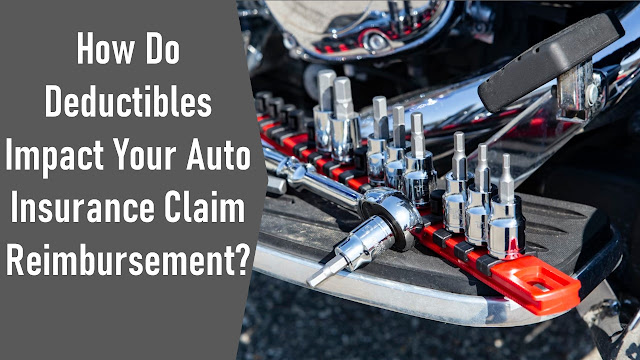How Do Deductibles Impact Your Auto Insurance Claim Reimbursement?

Introduction.
In this article, I'll delve into a critical aspect of auto insurance that often leaves policyholders perplexed: the impact of deductibles on the reimbursement of auto insurance claims. Understanding deductibles is pivotal for anyone navigating the complex landscape of automobile insurance. These financial thresholds play a pivotal role in determining how much you receive from your insurance company in the event of a covered loss or accident. Whether you're a seasoned driver or a novice in the world of auto insurance, grasping the nuances of deductibles can empower you to make informed decisions, ensuring that you're adequately protected while also managing your premium costs.
We'll explore the fundamental concepts behind deductibles, dissect their role in claim settlements, and shed light on strategies to optimize their impact on your coverage. So, if you've ever wondered why your reimbursement doesn't always match the total cost of your claim, or if you're contemplating adjusting your deductible, this article will provide valuable insights to help you navigate the intricacies of auto insurance with confidence.
- Deductibles define your share of expenses in auto insurance claims.
- Higher deductibles lower premiums but increase your financial responsibility.
- Low deductibles mean insurers cover more costs in claims.
- Choosing the right deductible balances cost and coverage preferences.
- Deductibles affect reimbursement, so consider your financial readiness.
- Learn to navigate deductibles for optimal auto insurance claim benefits.
Deductibles define your share of expenses in auto insurance claims.
Deductibles in auto insurance represent the initial out-of-pocket amount you agree to pay when filing a claim. This means that if you're involved in an accident or your vehicle sustains damage, you'll need to cover a portion of the repair or medical expenses before your insurance company steps in. For example, if you have a $500 deductible and your claim amounts to $2,000, you'll pay the first $500, and your insurer will reimburse you for the remaining $1,500.
Understanding your deductible is crucial because it directly impacts how much you'll receive in reimbursement from your insurance company. Higher deductibles typically result in lower monthly premiums, as you're taking on more financial responsibility in the event of a claim. On the other hand, lower deductibles lead to higher premiums, as the insurance company is committing to cover a larger portion of your expenses.
Deductibles serve as a financial checkpoint in your auto insurance policy, shaping the balance between what you're willing to pay upfront and what you expect from your insurer when accidents or unforeseen events occur. Your deductible choice should align with your financial capacity and risk tolerance, as it will affect your insurance costs and how much you receive in reimbursement when you need to make a claim.
Higher deductibles lower premiums but increase your financial responsibility.
Opting for a higher deductible in your auto insurance policy can lead to significant cost savings in the form of lower monthly premiums. This is because you're essentially telling the insurance company that you're willing to bear a greater portion of the financial burden in the event of an accident. As a result, the insurer has less financial risk to cover, which translates into reduced premium costs for you.
However, it's essential to be aware that higher deductibles also mean you'll need to pay more upfront if you ever need to make a claim. While this can be financially advantageous over time if you don't frequently encounter accidents or incidents, it also places a greater responsibility on your shoulders when unexpected events occur. It's crucial to have the funds available to cover your chosen deductible if you find yourself in a situation where you need to file a claim.
Therefore, when considering higher deductibles to lower your premiums, it's essential to strike a balance between potential savings and your ability to cover the deductible comfortably in case of an accident. This choice hinges on your financial stability and your willingness to assume more risk to reduce ongoing insurance costs.
Low deductibles mean insurers cover more costs in claims.
On the opposite end of the deductible spectrum, low deductibles translate to higher monthly premiums but offer the advantage of your insurance company covering a more substantial portion of your expenses when you make a claim. In essence, with a lower deductible, you're shifting more financial responsibility onto your insurer, which can be comforting in times of accidents or unexpected incidents.
While lower deductibles provide peace of mind and require less immediate out-of-pocket expense, they come at the expense of higher monthly premium payments. Insurance companies charge more for policies with low deductibles because they are committing to cover a larger share of your claim costs. This means you'll pay more over time in premiums, which might not be cost-effective if you rarely need to use your insurance.
Low deductibles are often recommended for individuals who want to minimize their financial burden in the event of an accident, lack substantial savings to cover a high deductible, or anticipate needing to file claims more frequently. However, it's essential to weigh the increased premium costs against the benefits of lower deductibles to ensure that you're making a financially sound decision for your specific situation.
Choosing the right deductible balances cost and coverage preferences.
Selecting the appropriate deductible level in your auto insurance policy involves finding a balance that aligns with your financial situation and risk tolerance. It's a personal decision that should consider both your ability to cover the deductible amount if necessary and your desire for lower monthly premiums.
If you have the financial means to comfortably cover a higher deductible, you might opt for this choice to enjoy lower premiums and potential long-term savings. This is a prudent strategy if you have a good track record of safe driving and rarely need to make claims.
Conversely, if you'd prefer to minimize your upfront costs in case of an accident and can afford higher monthly premiums, you may opt for a lower deductible. This provides greater peace of mind but comes at the cost of higher ongoing insurance expenses.
Deductibles affect reimbursement, so consider your financial readiness.
When you're navigating the impact of deductibles on auto insurance claim reimbursement, it's crucial to assess your financial readiness for unforeseen circumstances. The deductible amount you select determines the initial expenses you'll be responsible for when making a claim. To avoid financial strain during these situations, you should have the funds readily available to cover the chosen deductible.
If you opt for a high deductible to reduce your premium costs, it's essential to ensure that you have sufficient savings set aside. This ensures you can comfortably meet your financial obligation when an accident or incident occurs. Having an emergency fund dedicated to your deductible can provide peace of mind and streamline the claims process.
Conversely, if you choose a low deductible to minimize immediate expenses during a claim, you'll need to be prepared for higher monthly premium payments. This requires budgeting for the increased ongoing insurance costs to ensure they align with your financial goals.
Learn to navigate deductibles for optimal auto insurance claim benefits.
Navigating deductibles in the realm of auto insurance claims is a crucial aspect of ensuring you maximize the benefits of your policy. Deductibles represent the initial amount you're responsible for paying out of pocket when you make a claim before your insurance kicks in. It's important to strike a balance between a high and low deductible that aligns with your financial situation and risk tolerance. A higher deductible typically results in lower monthly premiums, making it an attractive option for those who want to save on insurance costs.
However, it means you'll have to cover a larger portion of the expenses in case of an accident. On the other hand, a lower deductible means higher monthly premiums but lower immediate costs in the event of a claim. Deciding on the right deductible involves evaluating your financial readiness to cover unexpected costs and your past driving history. For those with a clean record and a strong financial cushion, a higher deductible might make sense as it can lead to significant savings over time. Conversely, if you're concerned about your ability to cover a substantial deductible in case of an accident, a lower deductible provides peace of mind, albeit at a higher monthly cost.
Understanding your deductible options and assessing your financial standing is a crucial first step in navigating auto insurance claims effectively. Furthermore, understanding how deductibles interact with your auto insurance coverage is essential. Comprehensive and collision coverage are two common components of an auto insurance policy. Comprehensive covers damage to your vehicle that results from non-collision incidents like theft, vandalism, or natural disasters.
Conclusion.
I hope this exploration of how deductibles affect your auto insurance claim reimbursement has shed light on this critical aspect of your policy. Deductibles play a pivotal role in determining the financial responsibility you bear after an accident, directly influencing your out-of-pocket expenses and overall claim experience.
Understanding the relationship between deductible amounts and premium costs is crucial in making informed decisions about your auto insurance. By opting for a higher deductible, you can reduce your premium costs but should be prepared for a larger upfront payment in the event of a claim. Conversely, a lower deductible may result in higher premiums but provides greater financial relief when filing a claim. Ultimately, finding the right deductible balance depends on your individual financial situation and risk tolerance. It's essential to carefully assess your needs and consult with your insurance provider to strike the right balance between affordability and comprehensive coverage to safeguard your financial well-being on the road.




Comments